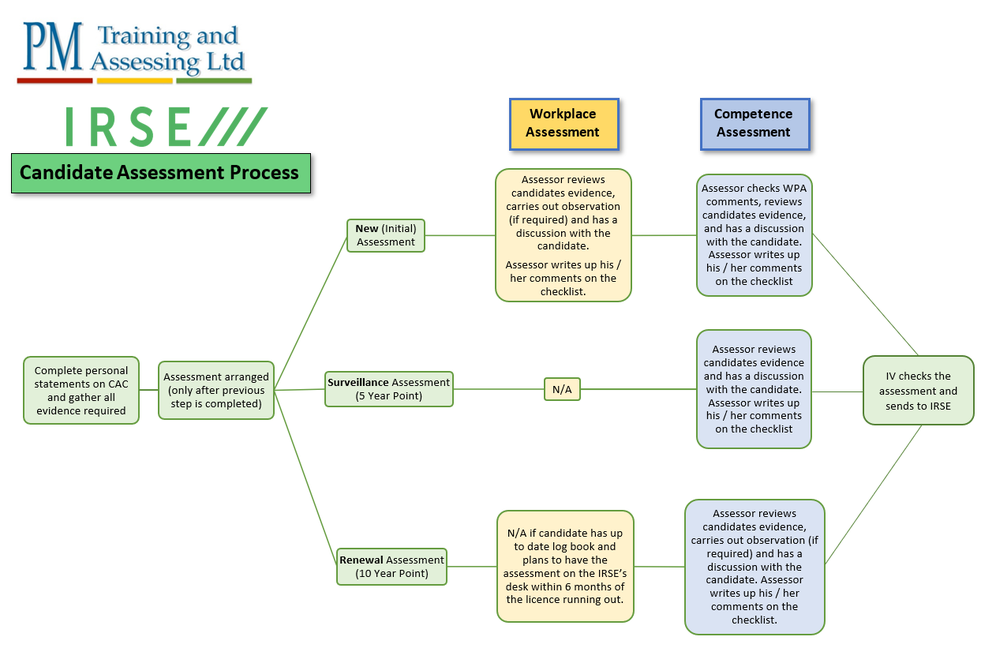Need an IRSE Licence? We can help.

The IRSE’s Licensing Scheme exists to provide a recognised means of assessing the competence of railway signalling and telecom personnel. It is recognised in the UK and many other countries around the world.
PM Training and Assessing can provide assessments for most IRSE licences in these categories:
- Signalling Design
- Signalling Installation
- Signalling Testing
- Signalling Maintenance
- Signalling Telecoms
- Engineering Manager and Senior Manager
For details of the requirements for the licences in each group click on the link to the IRSE Licencing web site below or go to our contact page and get in contact with us.
We work in a slightly different way to most Assessing Agencies in that most of our assessors are contracted to use for individual assessments. This means that we have access to a wide variety of assessors across the UK and can be flexible in our approach to assessments.
Get advice and guidance on IRSE Licensing
We know the IRSE licencing process through and through. To help you understand what is required for you to achieve your licence, we have put together a dedicated page answering some frequently asked questions about the IRSE Licencing process. We encourage you to check it out if you need some answers or if you are confused about any aspect of the assessment process, including help on how to fill in your personal statements on the Competence Assessment Checklist (CAC).

Working with companies
PM Training and Assessing acts as the Assessing Agency for companies who don't wish to have their own assessing agency but have their own assessors and want an agency to process their assessments. If your company requires our services please contact us.

Training IRSE Assessors
All IRSE assessors must hold a national qualification in assessing. They must also be experienced and/or qualified in the areas they are assessing. We can provide such training to assessors.

IRSE Assessor Development
We provide training opportunities for both workplace and competence assessors to consolidate and expand their assessing skills.
IRSE Assessment Process
For a new licence category the assessment process has 3 stages:
1 - Candidate Statement.
The candidate writes a personal reflective statement on the checklist for each performance criteria giving examples what they do to meet each of the criteria. They also make a list of evidence from the work they have done that demonstrates it was them doing the work. This could be documents, pictures or witness statements. The candidate must make sure that their IRSE log book is up to date and has been reviewed in the last 12 months. Assessments will be arranged only after this process is complete.
2 - Workplace Assessment.
A workplace assessor will look through the candidate's statements and evidence. The assessor will observe the candidate if it is a category that requires observation e.g. installation, testing and maintenance.
3 - Competence assessment.
A competence assessor will look through the personal statement and workplace assessor comments. They will have a verbal discussion with the candidate to confirm that the candidate is at the desired level.
If both assessors agree that the candidate is competent, then the paperwork is checked and the application sent to the IRSE.
5 year Point - Surveillance
If you are at the 5 year point then after the date on your licence there will be an 'S'. At this point you do not need to have a workplace assessment, as long as you have an up to date log book and are still doing work for the category you are applying for.
You are able to redo your licence at any time but if you go past the end date on your licence then the next 5 years will be added to the date your licence ran out, not the date of your assessment.
10 year Point - Renewal
If you are at the 10 year point then after the date on your licence there will be an 'R'. At this point you do not need to have a workplace assessment, as long as you have an up to date log book and are still doing work for the category you are applying for. You also need to have your assessment completed within 6 months of your licence running out. At this point if there is observation required in the category you are applying for you will need to be observed.
If you do not renew your licence within the 6 months then you need to have a full new assessment.
IRSE Licencing Website
The IRSE website has been designed to give licence holders and the general public an overview of how the Licensing Scheme works. It also provides guidance and support to those who are working towards their licence, and briefing notes for licence holders and others on changes to the Scheme.

